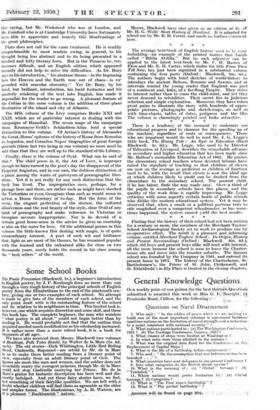Some School Books
The Poetic Procession (Blackwell, Is.), a beginner's introduction' to English poetry, by J. F. Roxburgh does no more than run
through a very rough history of the principal schools of English poetry from the Elizabethans to the end of the nineteenth cen- ' tury, giving one or two examples of each school. No attempt' is made to give lists of the members of each school, and the only point dealt with is the outstanding feature of the school and its relation to its neighbours in time. This limited task is, however, one which requires discretion and some skill, and these this book has. The complete beginner, the man who wonders " what poetry is all about," could not begin better than by 1 reading it. He would probably not find that the outline thus acquired needed much modification as his scholarship increased. It is rather more than a mere school book, it is. a book for heginneis of all ages. - - . - . . : . ' -.
We have also received from Messrs. Blackwell two volumes of Readings, Polk Tales Retold, by Walter de In Mare (is. 8d. each). The old stories—Dick Whittington, Little Red Riding Mood, Cinderella, Rapunzel—are retold by Mr. de la Mare so as to make them better reading from a literary point of view, especially from an adult literary point of view. The figures are more like men and women, and the soldier does not Invariably marry the youngest princess, though Mr. de In Mare could not stop Cinderella marrying her Prince. Mr. de la Mare's genius for fantastic description has been well and dis- creetly mdulged. And yet these fairy stories have, we feel, lost something of their fairylike qualities. We are left with a doubt whether children will find them as agreeable as the older and simpler forms. The illustrations, by. A,-Hr Watson, are 6f a pleasant "Rackharnish l'..natu,re,, ,
Messrs., Bliclmell, have also given us an edition at 2s. of Mr.' H. G. Wells' Short History of Mankind. It is adapted for school use by Mr. E.-H. Carter, and needs no further comment here.
* * -*










































 Previous page
Previous page